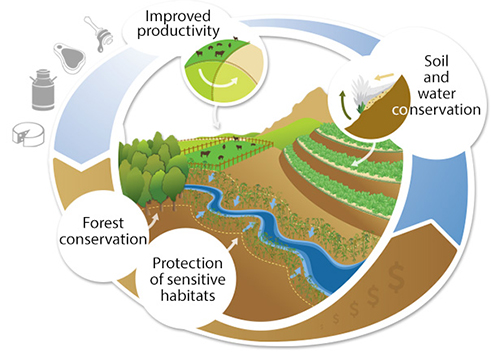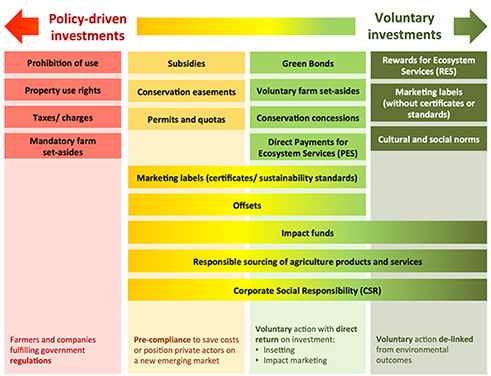Incentives for ecosystem services
Why farmers need incentives
Competing uses for land and water cause the degradation and reduction of ecosystem services. This has costs to farmers and other users. A combination of best practices, at landscape level, can rehabilitate and protect ecosystem services, enable sustainable production, and improve food security and livelihoods.
The transition to and implementation of these sustainable practices, however, requires additional effort from farmers. To break the vicious cycle of ecosystem degradation, farmers must, therefore, be provided with incentives to overcome adoption barriers to restore and manage landscapes through sustainable improvements in productivity. An Incentives for Ecosystem Services (IES) package can create an umbrella of existing public programmes, private sector investment and civil society initiatives to co-finance and support farmers in this transition. Public policies to improve farm productivity can be combined with those that reward conservation practices. Both can see its results maximized by partnering with green business strategies, such as ecological value-added markets.
IES can provide incentives to:
- Overcome short-term needs such as improved seeds, organic fertilizer and irrigation to support improved productivity and therefore require less land for cultivation, allowing for greater investment in conservation practices.
- Support long-term transition such as improved crop storage and processing combined with improved access to markets to render sustainable practices worthwhile in the long-term

Sources of incentives
There are already various programmers offering these incentives, but they are usually de-linked from compliance with conservation and sustainable management of agro-ecosystems, and are usually applied in isolation.
IES from agriculture integrates packages of public, private and civil society measures to support farmers in the adoption of sustainable agricultural practices that benefit the environment and protect long-term food security. This combination of incentives brings farmer to a new balance, where more ecosystem services can be provided at lower costs, and with greater long-term benefits.

What we do
- Identify and describe the conditions for successful IES packages through case studies analysis. Specifically, we focus on farmers’ motivations, private sector commitments and the enabling legal and institutional frameworks that allow these stakeholders to build IES packages together.
- Foster forums for debate on IES packages at the global, regional and national level. We provide opportunities for cross-fertilization between geographies and development of locally-adapted IES packages and policies.
- Develop a web toolbox for policy makers and other stakeholders to combine and successfully implement IES.
- Support focus countries in the development of an IES-enabling policy framework to allow the transition towards a more sustainable agricultural sector.

